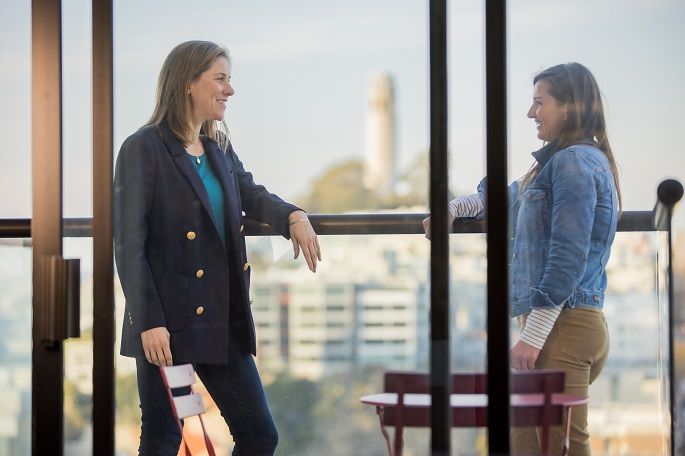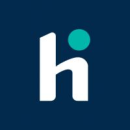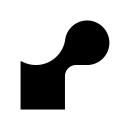Steve Jobs once likened teamwork to polishing rocks.
In a 1995 PBS interview, the Apple co-founder recounted a childhood memory in which he watched a rock tumbler transform “regular, old, ugly rocks” into “beautiful stones.”
“That’s always been in my mind my metaphor for a team working really hard on something they’re passionate about,” Jobs said. “It’s through the team, through that group of incredibly talented people, bumping up against each other…and working together, they polish each other and they polish the ideas.”
Like Jobs, employees from these San Francisco companies know that true innovation demands effective collaboration. Though they may encounter challenges in their fast-growing startup environments, these employees take ownership over technical issues, share their areas of expertise and work across teams to devise creative solutions.
In addition to championing a collaborative spirit, these featured companies are expanding quickly and hiring for roles in development and engineering, operations, project management and more.
Built In San Francisco connected with employees at Human Interest and Render and VSCO to learn more about their exciting projects and professional growth opportunities.

Human Interest is an HR tech company that offers affordable 401(k) retirement plans.
Think back to your early days on the job. What stood out to you most about Human Interest’s culture?
Autonomy and collaboration have always struck me as the dominant aspects of the Human Interest culture. To some degree, these ideas seem contradictory, but they are two really powerful patterns of human excellence when enacted conscientiously.
Human Interest’s culture invites really smart people to take ownership of important problems and work to find solutions to those problems. This was immediately apparent to me and, frankly, inspiring. It also felt normal coming from small startups where one doesn’t “take ownership”; one simply has it.
Human Interest’s culture invites really smart people to take ownership of important problems and work to find solutions.”
It’s not a utopia, of course. When I started three years ago, teams were almost monomaniacal about optimizing workflows inside the borders of their domain areas. This created a lot of downstream turbulence and churn between teams, which was especially evident where workflows included handoffs.
Operating in ambiguity — and turbulence — is part of the deal in a fast-growing startup. Being purposeful about learning is a choice. Taking ownership of an important problem is a powerful way to begin the learning process. Commit, then figure it out.
What’s the coolest project that you’ve worked on recently, and what skills did it help you develop?
Our development organization has a really ambitious agenda this year. Executing the fullness of this agenda on time is probably our greatest challenge right now. To ensure that we stay on track, we are introducing a new practice called delivery review.
At the core of this system are two things: a templated quarterly roadmap document and a biweekly live reporting meeting constructed like a train schedule. The process gives teams the support of accountability by bringing daylight at regular intervals, and it gives our leaders high-fidelity information about how things are going.
Change means breaking systems that may have become comfortable, even if they aren’t effective. Introducing this new system has reminded me that every new process is bought on credit and, in a practical way, your budget for change is determined by your credit limit. How much does the team trust you?
Another practical idea is that it doesn’t hurt to make room for new proposed processes by deprecating existing ones. Selling your old couch not only makes room for the new one but helps pay for it. Bundling and streamlining existing functions into a new one has helped expand our change budget significantly.
Render hosts a unified cloud platform for anything from static sites to complex applications.
Think back to your early days on the job. What stood out to you most about Render’s culture?
The collaborative spirit at Render was evident to me from the beginning. I was speaking with people on all teams to understand our product and gain the context needed to understand our customers. Not only do we have a very welcoming team that is friendly to cross-functional discussions, but we also have a strong culture of building resources that allow newcomers to understand how to get started quickly.
The onboarding at Render was great. Our twice-yearly “Rendervous” weeks, when the whole team comes together in the office, have deepened team-to-team collaborative relationships for me.
Not only do we have a very welcoming team but we also have a strong culture of building resources that allow newcomers to understand how to get started quickly.”
How long have you been with Render, and what professional growth have you experienced in that time?
I’ve been here at Render for nine months now. During that time, I have had the chance to pursue areas of interest related to company growth and development. It’s been empowering, and it has allowed me to use my background in research methodology and information literacy.
I am in pursuit of understanding the ways in which our product can grow — both in terms of usefulness, through insights about what users want as part of the product’s development, and brand awareness. I love cultivating community.
VSCO is a trusted photo and video editor for creative professionals.
Think back to your early days on the job. What surprised you or stood out to you most about your company's culture?
One thing that stands out to me is how we collaborate. We have regular code reviews and pair programming sessions where team members have the opportunity to learn from and teach each other.
It’s not a coincidence that a company built for creators attracts amazingly creative builders. Musicians, painters, botanical artists, pilots, photographers (of course)…this list goes on. I believe when a company values creativity, team members are empowered to experiment and come up with new ideas.
One thing that stands out to me is how we collaborate.”
How long have you been with the company, and what professional growth or development have you seen in that time?
I’ve been with VSCO for 4.5 years. In that time, I’ve had the opportunity to work on multiple projects and technologies. Working in a startup environment means you learn fast by doing. This year, I'm excited to deep dive into SwiftUI with the team. I’ve also had the opportunity to lead teams and mentor junior team members. It’s rewarding helping the team reach their professional goals.










